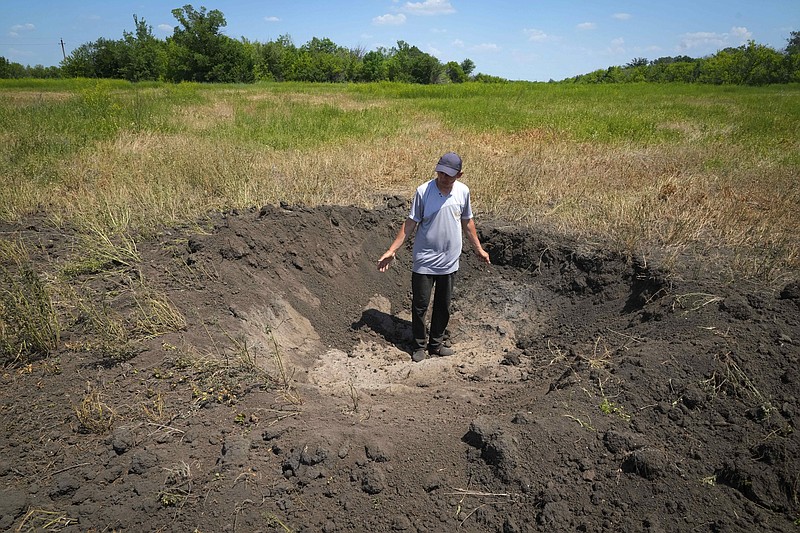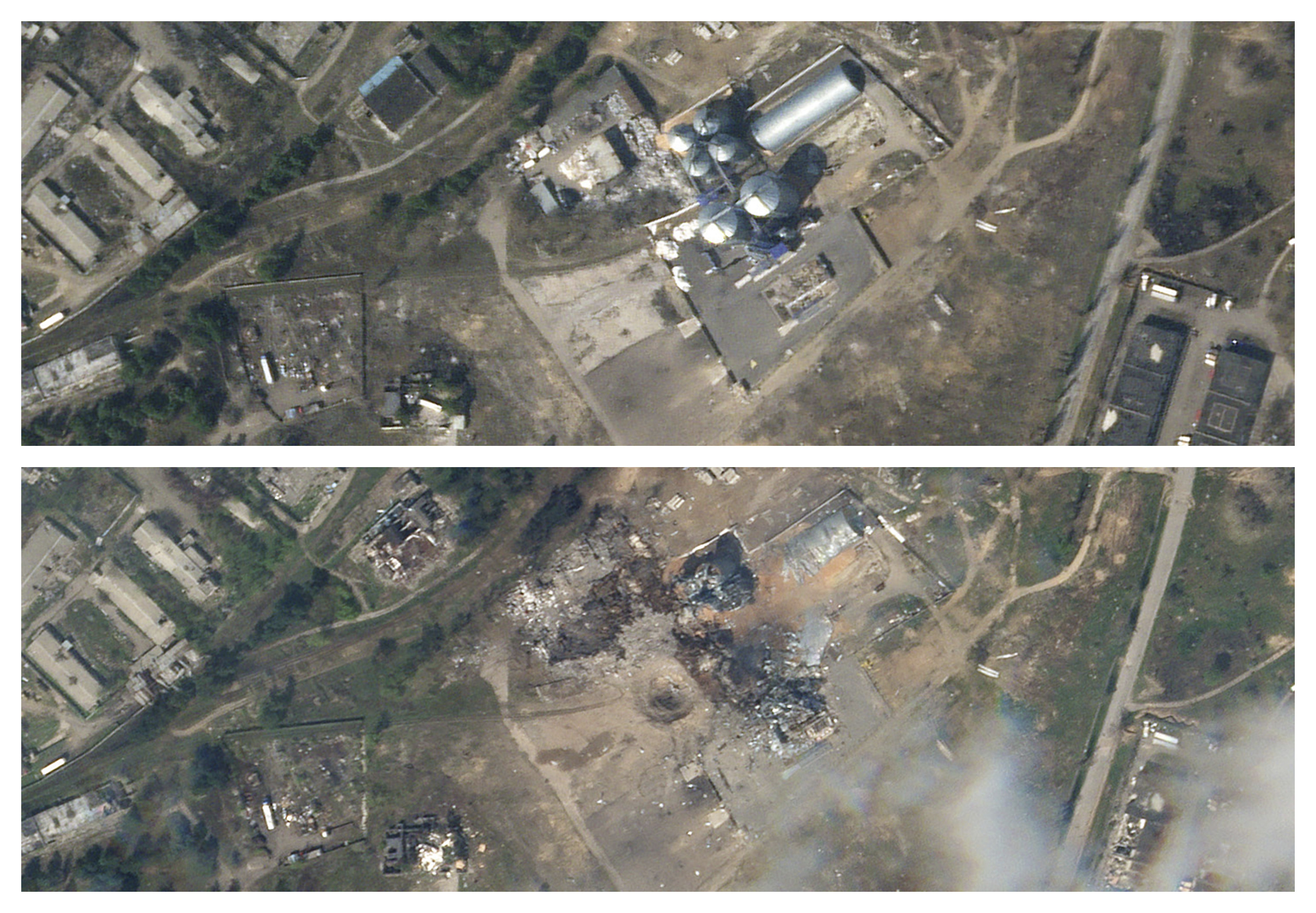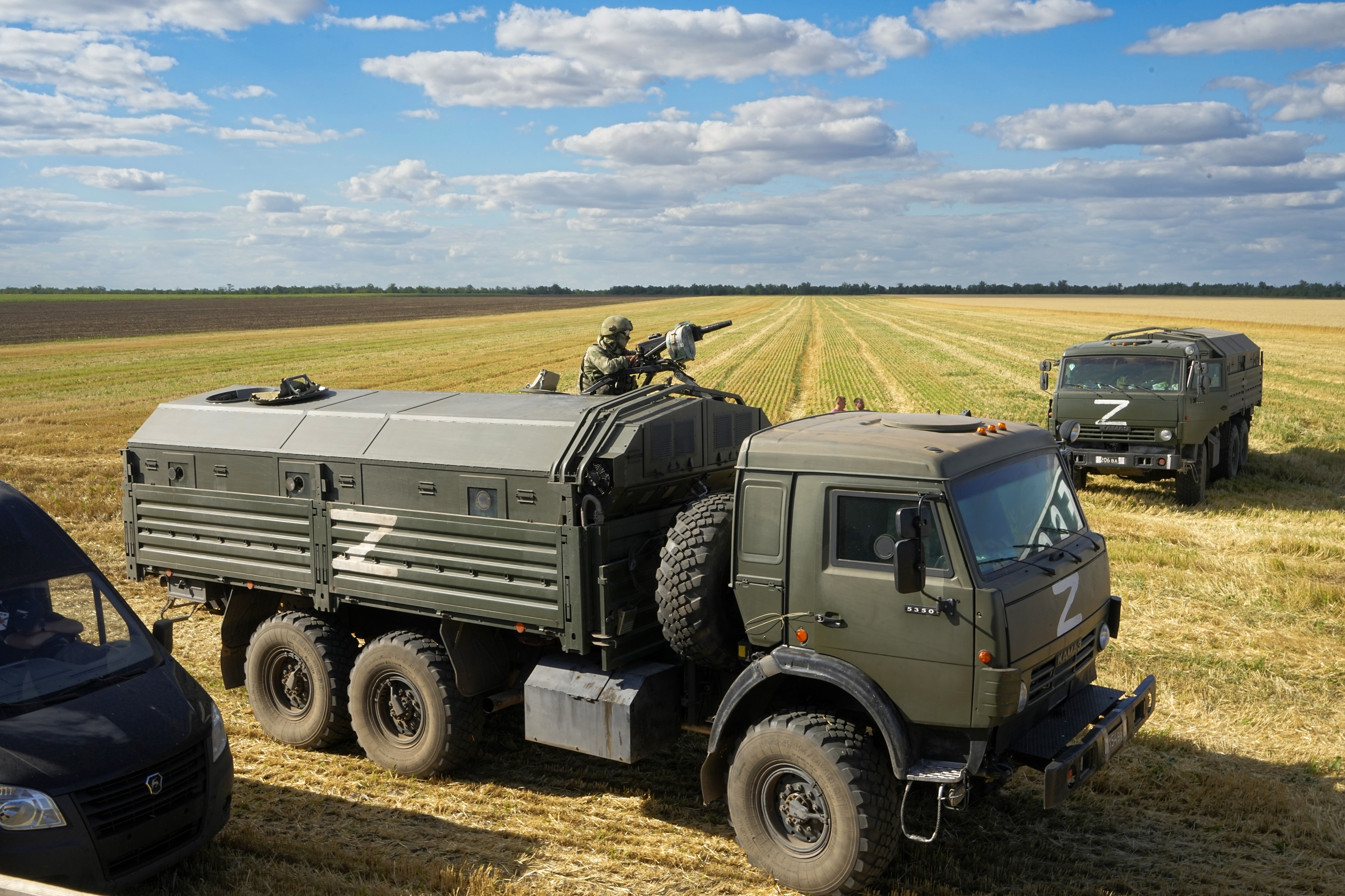BEIRUT -- When the bulk cargo ship Laodicea docked in Lebanon last summer, Ukrainian diplomats said the vessel was carrying grain stolen by Russia and urged Lebanese officials to impound the ship.
Moscow called the allegation "false and baseless," and Lebanon's prosecutor general sided with the Kremlin and declared that the 10,000 tons of barley and wheat flour wasn't stolen and allowed the ship to unload.
But an investigation by The Associated Press and the PBS series "Frontline" has found that the Laodicea, owned by Syria, is part of a sophisticated Russian-run smuggling operation that has used falsified manifests and seaborne subterfuge to steal Ukrainian grain worth at least $530 million -- cash that has helped feed President Vladimir Putin's war machine.
The AP used satellite imagery and marine radio transponder data to track three dozen ships making more than 50 voyages carrying grain from Russian-occupied areas of Ukraine to ports in Turkey, Syria, Lebanon and other countries. Reporters reviewed shipping manifests, searched social media posts and interviewed farmers, shippers and corporate officials to uncover the details of the smuggling operation.
POSSIBLE WAR CRIME
The ongoing theft, which legal experts say is a potential war crime, is being carried out by wealthy businessmen and state-owned companies in Russia and Syria, some of them already facing financial sanctions from the United States and European Union.
Meanwhile, the Russian military has attacked farms, grain silos and shipping facilities still under Ukrainian control with artillery and airstrikes, destroying food, driving up prices and reducing the flow of grain from a country long known as the breadbasket of Europe.
The Russians "have an absolute obligation to ensure that civilians are cared for and to not deprive them their ability of a livelihood and an ability to feed themselves," said David Crane, a veteran prosecutor who has been involved in numerous international war crime investigations. "It's just pure pillaging and looting, and that is also an actionable offense under international military law."
The grain and flour carried by the 453-foot-long Laodicea likely started its journey in the southern Ukrainian city of Melitopol, which Russia seized in the early days of the war.
Video posted to social media July 9 shows a train pulling up to the Melitopol Elevator, a massive grain storage facility, with green hopper cars marked with the name of the Russian company Agro-Fregat LLC in big yellow letters, along with a logo in the shape of a spike of wheat.
Russian occupation official Andrey Siguta held a news conference at the depot the following week where he said the grain would "provide food security" for Russia-controlled regions in Ukraine, and that his administration would "evaluate the harvest and determine how much will be for sale."
As he spoke, a masked soldier armed with an assault rifle stood guard as trucks unloaded wheat at the facility to be milled. Workers loaded flour into large white bags like those delivered by the Laodicea to Lebanon three weeks later.
Siguta, along with four other top Russian occupation officials, was sanctioned by the U.S. government on Sept. 15 for overseeing the theft and export of Ukranian grain.
Putin signed treaties Friday to annex four occupied regions of Ukraine into the Russian Federation, in defiance of international law. The U.S. and EU immediately rejected "the illegal annexation."
Melitopol Mayor Ivan Fedorov told the AP that the occupiers are moving vast quantities of grain from the region by train and truck to ports in Russia and Crimea, a strategic Ukrainian peninsula that Russia has occupied since 2014. Despite Russian claims to have annexed Crimea, the United Nations ruled that land grab was also illegal.
Videos posted on social media in recent months show a steady stream of grain transport trucks moving south through occupied areas of Ukraine with the letter "Z" painted on their sides, a wartime symbol for Russia and its military forces. Agro-Fregat train cars have been recorded rolling through the Crimean port town of Feodosia, where satellite imagery shows trucks and trains lined up as grain was being loaded onto ships.
The Kremlin has denied stealing any grain, but Russia's state-run news agency Tass reported June 16 that Ukrainian grain was being trucked to Crimea, resulting in long lines at border checkpoints. Tass later reported that grain from Melitopol had arrived in Crimea and that additional shipments were expected, bound for customers in the Middle East and Africa.
A July 11 satellite image shows the Laodicea tied up at a pier in Feodosia. The ship's radio transponder was turned off and its cargo holds were open, being filled with a white substance from waiting trucks. Two weeks later, when it arrived at the Lebanese port city Tripoli, it claimed to be carrying grain from a small Russian port on the other side of the Black Sea.
A copy of the ship's manifests obtained by the AP claimed that its port of origin was Kavkaz, Russia. Its cargo was listed as nearly 10,000 metric tons of "Russian Barley and Russian Flour in Bags." The shipper was listed as Agro-Fregat and the buyer was Loyal Agro Co Ltd., a wholesale grocer headquartered in Turkey.
Agro-Fregat didn't respond to emailed questions and soon after the AP's inquiry, the company's website appears to have been taken down. A phone number that had been listed on the website was out of service last week.
A spokesman for Loyal Agro said the company took delivery of 5,000 tons of flour and the rest of the ship's cargo went to Tartus, Syria.
"We reached an agreement with Russia, the flour came from Russia," said Muhammed Cuma, a spokesman for the company. "If the flour was stolen, then the Lebanese authorities would not have allowed it (to be imported)."
But the Laodicea couldn't have picked up its cargo in Kavkaz, the Russian port listed on the manifest. The ship's hull, which reaches 26 feet below the surface, would run aground in the relatively shallow port, which according to Russia's transport regulator can only accommodate ships with a maximum depth of 17.5 feet.
The port in Feodosia is more than twice as deep -- easily able to accommodate the big ship.
MORE SMUGGLERS
Another company involved in smuggling grain is United Shipbuilding Corp., a Russian state-owned defense contractor that builds warships and submarines for Russia's navy. In April, the company and its senior executives were sanctioned by the United States for providing weapons to the Russian war effort.
The company, through its subsidiary Crane Marine Contractor, bought three cargo ships just weeks before Putin invaded Ukraine, in a departure from its core business providing heavy-lift platforms to the oil and gas industry.
The three ships have made at least 17 trips between Crimea and ports in Turkey and Syria.
A spokeswoman for United Shipbuilding Corp. in Moscow didn't respond to questions sent via email. When the AP called Crane Marine Contractor, a receptionist answered by saying the company's name. A man she transferred the call to, however, insisted the AP had the wrong number.
"You have reached the wrong place, we do not have such information," said the man, who refused to give his name. "I have no clue what you are talking about and no clue who I can connect you with, do you understand?"
During a typical voyage in mid-June, a 560-foot-long ship called the Mikhail Nenashev was captured on satellite being loaded at the Russian-controlled Avlita Grain Terminal in Sevastopol, Crimea, while its radio transponder was turned off. The ship's crew turned the signal back on two days later while underway in the Black Sea.
It turned south toward the Mediterranean and arrived June 25 in Dortyol, Turkey, where exclusive video obtained by the AP shows it two days later at a pier owned by MMK Metalurji, a steel producer. Cranes at the dock can be seen scooping up large bucketloads of grain and dropping it into waiting trucks that drive away.
MMK Metalurji is the Turkish subsidiary of Magnitogorsk Iron & Steel Works, a major Russian steel conglomerate controlled by Viktor Rashnikov, a Russian billionaire who is close to Putin. Rashnikov and his company have been sanctioned by the U.S., the EU and the United Kingdom for providing revenue and equipment in support of Russia's war effort.
In an email to the AP, the company said the grain came from Russia: "The place where the said cargo is loaded is PORT KAVKAZ ... according to the customs declaration and the written declaration made by the shipping agency to us."
As with Laodicea, Nenashev's draught is too deep to dock at the Kavkaz port.
Ami Daniel, CEO of the marine data analytics company Windward, said ships running dark is a red flag that illegal activity is occurring. He said it is also common for smugglers to falsify shipping manifests and customs declarations to hide the true origin of their cargo.
"Illegally falsifying documentation is a tactic used by bad actors to disguise the origin of the goods they are transporting, be it for the purpose of evading sanctions, trafficking illicit goods or other crimes," said Daniel, a former Israeli naval officer.
Since the invasion, global grain prices have skyrocketed, boosting profits for Russian smugglers, while triggering what U.N. World Food Program director David Beasley on Sept. 15 called a "tsunami of hunger" affecting at least 345 million people.
While there is little evidence Ukrainians themselves are under threat of famine, Russia's war of aggression has starved its economy of export revenue. In 2021, before Russia's most recent invasion, Ukraine exported $5 billion worth of wheat, corn and vegetable oils -- primarily in the Middle East, Africa and Asia.
The high prices haven't helped Ukrainian farmers in the occupied regions, who have been forced to sell their harvests to Russian-controlled companies for half of what they would have been paid before the war, according to Fedorov, the Melitopol mayor. If a farmer refuses, he said, the Russians just take the grain anyway, paying nothing.
Ukrainian agricultural holding company HarvEast reported that Russians had taken about 200,000 metric tons of grain, which CEO Dmitry Skornyakov said cost his company about $50 million. He said his employees in the occupied Ukrainian city of Mariupol reported that the grain was trucked across the border into Russia.
"To steal it, they just drive to Rostov and Taganrog, small Russian ports, then mix it with the Russian grain and say that that is Russian grain," Skornyakov said.
The same appears to be happening at sea.
Satellite imagery and transponder data shows large cargo ships anchored off the Russian coast rendezvousing with smaller ships shuttling grain from Crimean and Russian ports, obscuring the true origin of the cargo. Those larger ships then carried the blended grain to Egypt, Libya, Iraq and Saudi Arabia.
INTRICATE ROLE
Turkey's role in the theft of Ukrainian grain is particularly sensitive because the NATO country has tried to play the role of mediator between the two warring countries.
Turkey helped broker an agreement between Russia and Ukraine in July to allow both countries to export grain and fertilizer through safe corridors in the Black Sea. The deal did not address the grain Russia has taken from occupied areas. In the last two months Ukrainian officials said more than 150 ships carrying grain have departed from ports they still control, including shipments to Somalia and Yemen, war-torn nations currently facing famine.
Yet there are also indications that the Turkish government itself may be a recipient of disputed grain from Ukraine. The AP and "Frontline" tracked trips from Crimea to Turkey by the smuggling ships Mikhail Nenashev, Laodicea and Souria to docks with seaside silos operated by the Turkish Grain Board, a government-run entity that imports and exports grain and other agricultural products.
The board's press office and executives did not respond to emails with detailed questions about the suspect shipments.
Though Turkish authorities have pledged to stop illegal smuggling, Turkey's foreign minister Mevlut Cavusoglu said in a June news conference that his country had not found any evidence of theft.
"We've received such claims," he said. "And such information is coming from the Ukrainian side from time to time. We take every claim seriously and investigate it seriously. ... In our investigation on ships' ports and goods' origins, following claims about Turkey, we saw the origin records to be Russia."
Whatever the records say, the smuggling operation continues.
Information for this article was contributed by Sarah El Deeb, Michael Biesecker, Beatrice Dupuy, Arijeta Lajka, Zoya Shu and Ahmad El-Katib of The Associated Press.
 The cargo ship Laodicea sails through the Bosphorus Strait in Istanbul, Turkey, on July 7, 2022. An Associated Press investigation shows the ship, owned by the Syrian government, is part of an extensive Russian-run smuggling operation that has been hauling stolen Ukrainian grain from ports in occupied Crimea to customers in the Middle East. (AP Photo/Yoruk Isik)
The cargo ship Laodicea sails through the Bosphorus Strait in Istanbul, Turkey, on July 7, 2022. An Associated Press investigation shows the ship, owned by the Syrian government, is part of an extensive Russian-run smuggling operation that has been hauling stolen Ukrainian grain from ports in occupied Crimea to customers in the Middle East. (AP Photo/Yoruk Isik)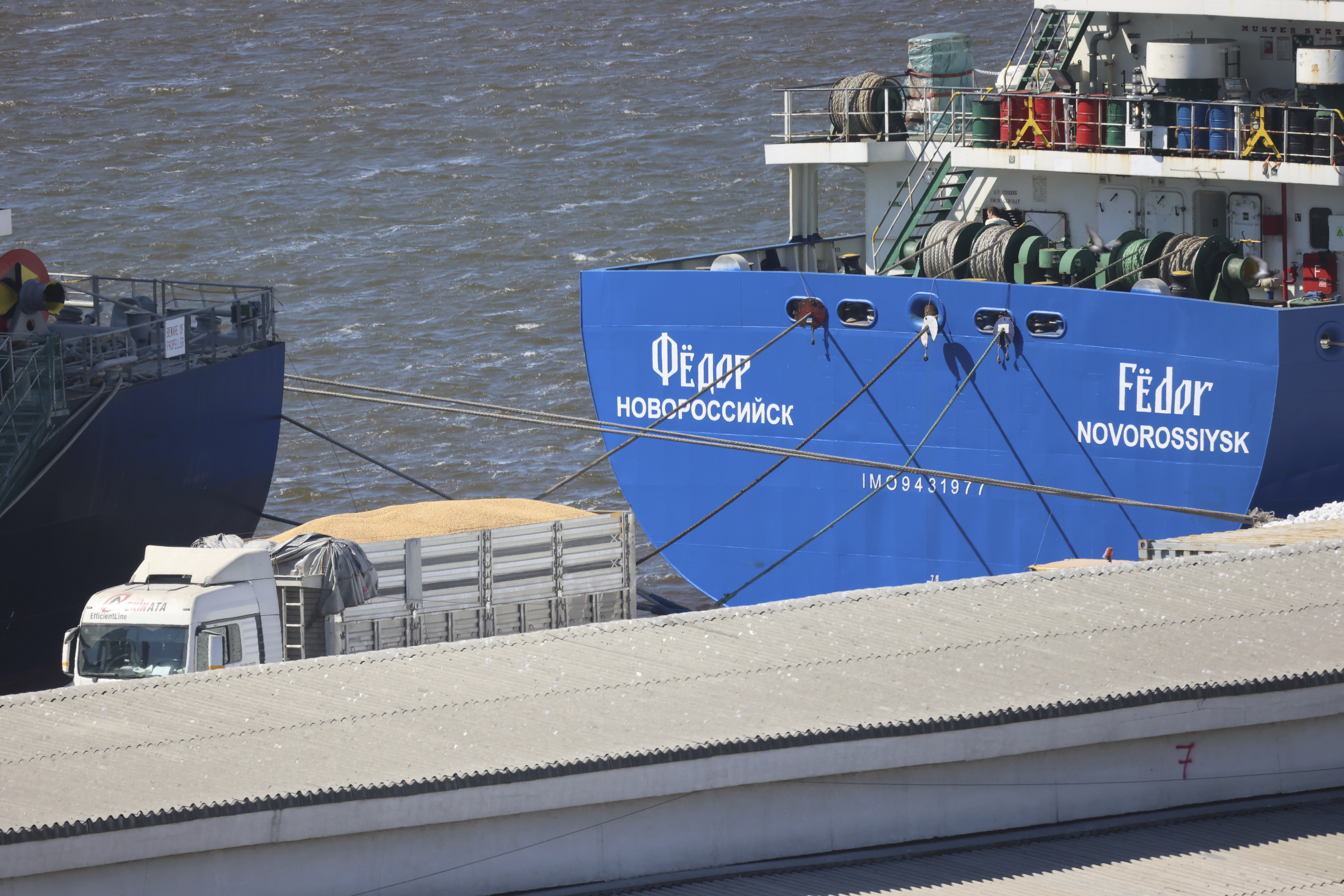 Grain from the cargo ship Russian-owned Fedor is loaded onto trucks in Bandirma, Turkey, on June 17, 2022. The grain, which satellite imagery shows was loaded at the Russian-occupied Ukrainian port of Sevastopol, Crimea, was purchased by the Turkish food company Yayla Agro. A spokesman for the company said it had been provided documents stating the cargo had come from the small Russian port of Kavkaz, more than 160 miles to the east of Sevastopol. (AP Photo/Yoruk Isik)
Grain from the cargo ship Russian-owned Fedor is loaded onto trucks in Bandirma, Turkey, on June 17, 2022. The grain, which satellite imagery shows was loaded at the Russian-occupied Ukrainian port of Sevastopol, Crimea, was purchased by the Turkish food company Yayla Agro. A spokesman for the company said it had been provided documents stating the cargo had come from the small Russian port of Kavkaz, more than 160 miles to the east of Sevastopol. (AP Photo/Yoruk Isik)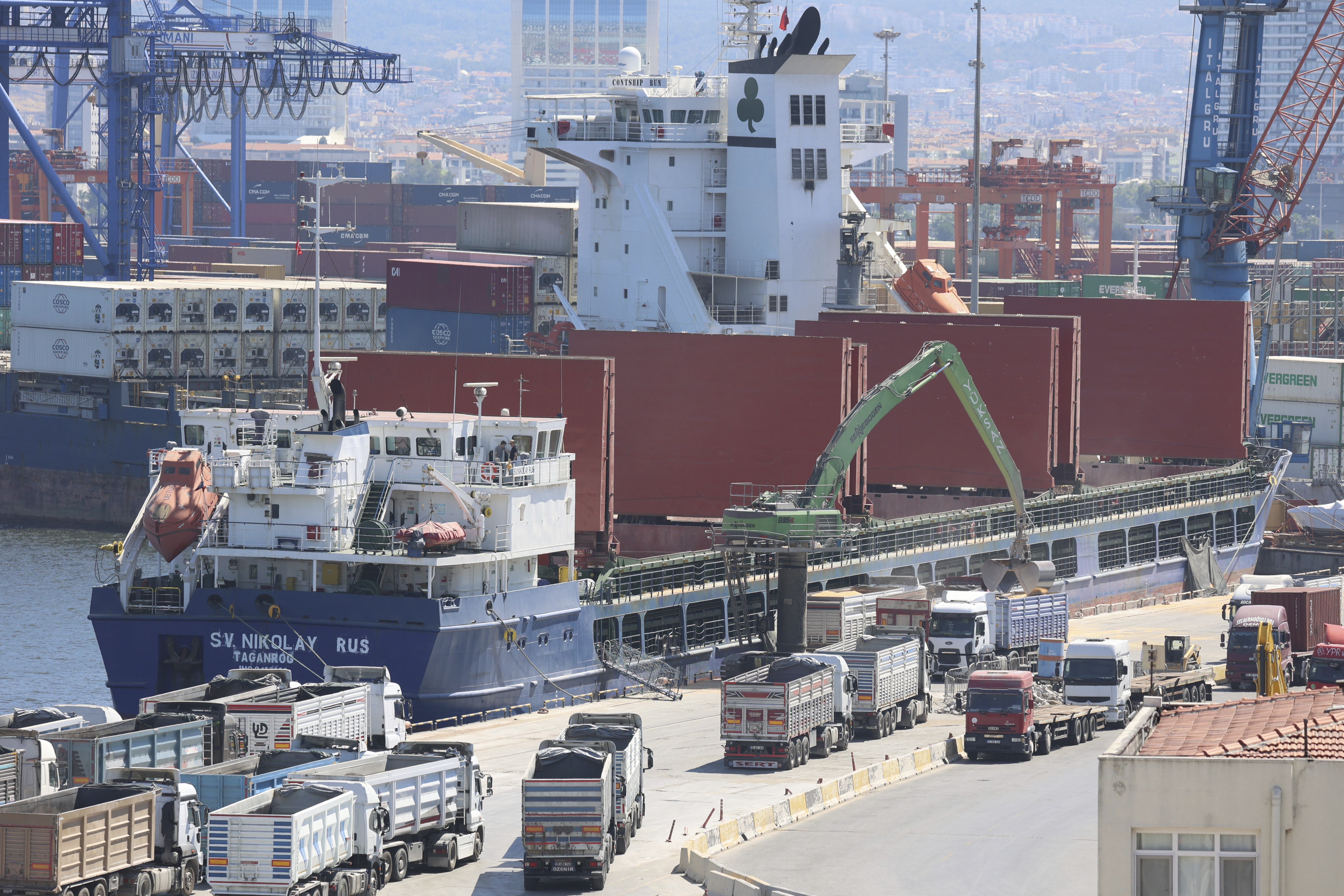 Grain is unloaded from the cargo ship SV. Nikolay docked in Izmir, Turkey, on June 25, 2022. The grain, which satellite imagery shows was loaded at the Russian-occupied Ukrainian port of Sevastopol, Crimea, was purchased by the Turkish food company Yayla Agro. A spokesman for the company said it had been provided documents stating the cargo had come from the small Russian port of Kavkaz, more than 160 miles (257 kilometers) to the east of Sevastopol. (AP Photo/Yoruk Isik)
Grain is unloaded from the cargo ship SV. Nikolay docked in Izmir, Turkey, on June 25, 2022. The grain, which satellite imagery shows was loaded at the Russian-occupied Ukrainian port of Sevastopol, Crimea, was purchased by the Turkish food company Yayla Agro. A spokesman for the company said it had been provided documents stating the cargo had come from the small Russian port of Kavkaz, more than 160 miles (257 kilometers) to the east of Sevastopol. (AP Photo/Yoruk Isik)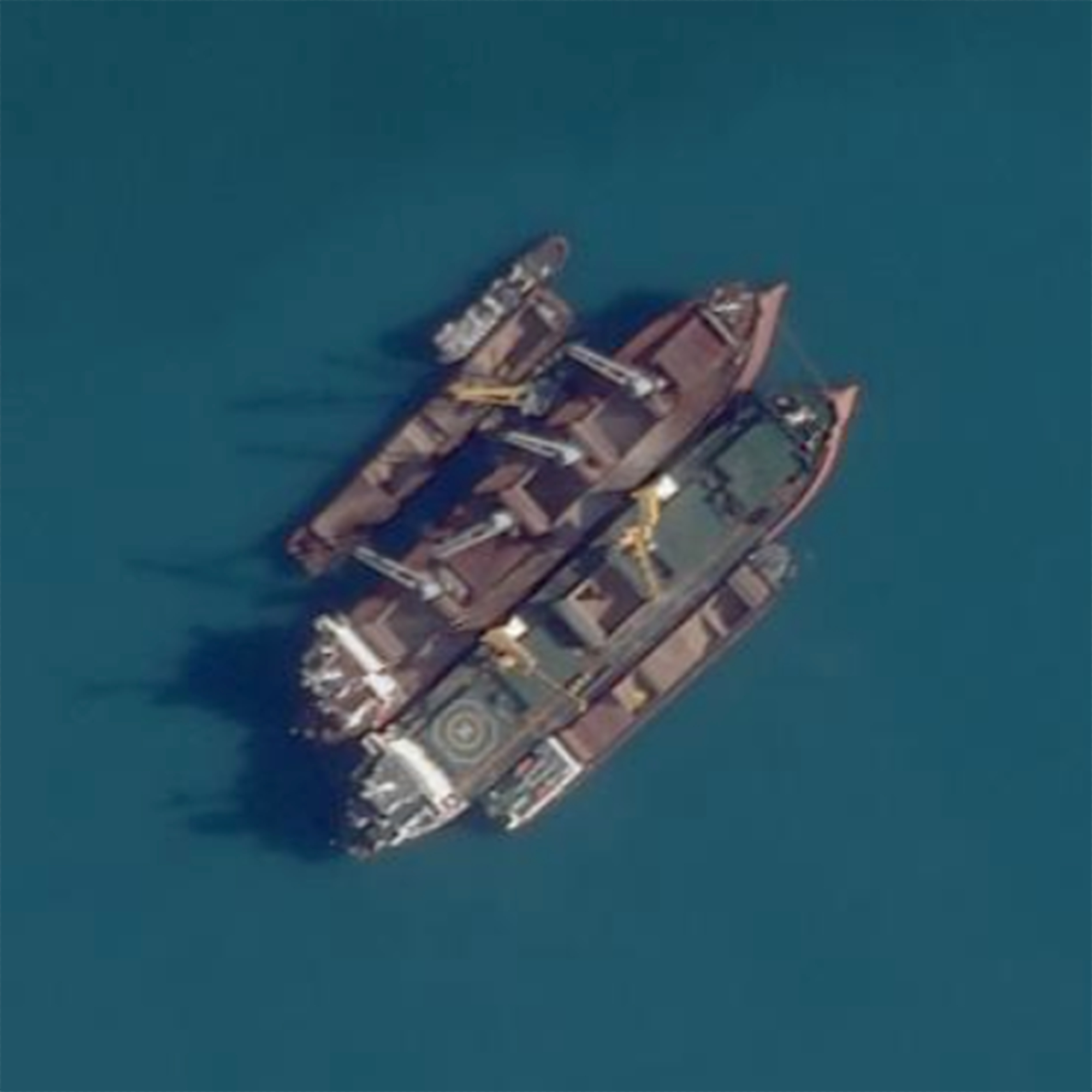 This Planet Labs satellite image shows a ship-to-ship transfer in the Kerch Strait, between Crimea and Russia, on Sept. 16, 2022. Satellite imagery and transponder data reviewed by The Associated Press shows numerous large cargo ships anchored off the Russian coast rendezvousing with smaller ships shuttling grain from both occupied Ukrainian ports in Crimea and Russian ports, obscuring the true origin of the cargo. Those larger ships then carried the blended grain to ports in Egypt, Libya, Iraq and Saudi Arabia. (Planet Labs via AP)
This Planet Labs satellite image shows a ship-to-ship transfer in the Kerch Strait, between Crimea and Russia, on Sept. 16, 2022. Satellite imagery and transponder data reviewed by The Associated Press shows numerous large cargo ships anchored off the Russian coast rendezvousing with smaller ships shuttling grain from both occupied Ukrainian ports in Crimea and Russian ports, obscuring the true origin of the cargo. Those larger ships then carried the blended grain to ports in Egypt, Libya, Iraq and Saudi Arabia. (Planet Labs via AP)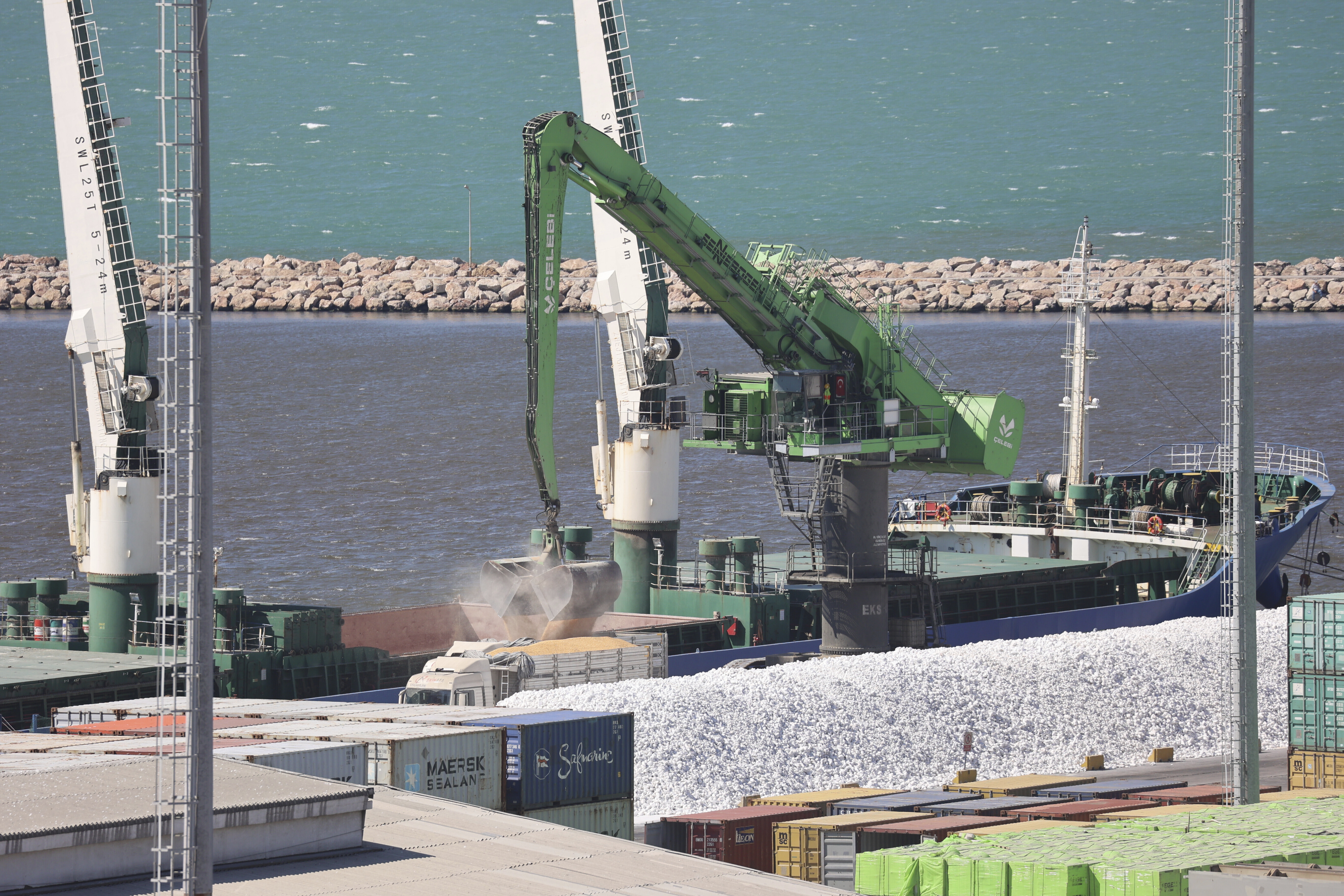 Grain from the Russian-owned cargo ship Fedor is loaded onto trucks in Bandirma, Turkey, on June 17, 2022. The grain, which satellite imagery shows was loaded at the Russian-occupied Ukrainian port of Sevastopol, Crimea, was purchased by the Turkish food company Yayla Agro. A spokesman for the company said it had been provided documents stating the cargo had come from the small Russian port of Kavkaz, more than 160 miles to the east of Sevastopol. (AP Photo/Yoruk Isik)
Grain from the Russian-owned cargo ship Fedor is loaded onto trucks in Bandirma, Turkey, on June 17, 2022. The grain, which satellite imagery shows was loaded at the Russian-occupied Ukrainian port of Sevastopol, Crimea, was purchased by the Turkish food company Yayla Agro. A spokesman for the company said it had been provided documents stating the cargo had come from the small Russian port of Kavkaz, more than 160 miles to the east of Sevastopol. (AP Photo/Yoruk Isik)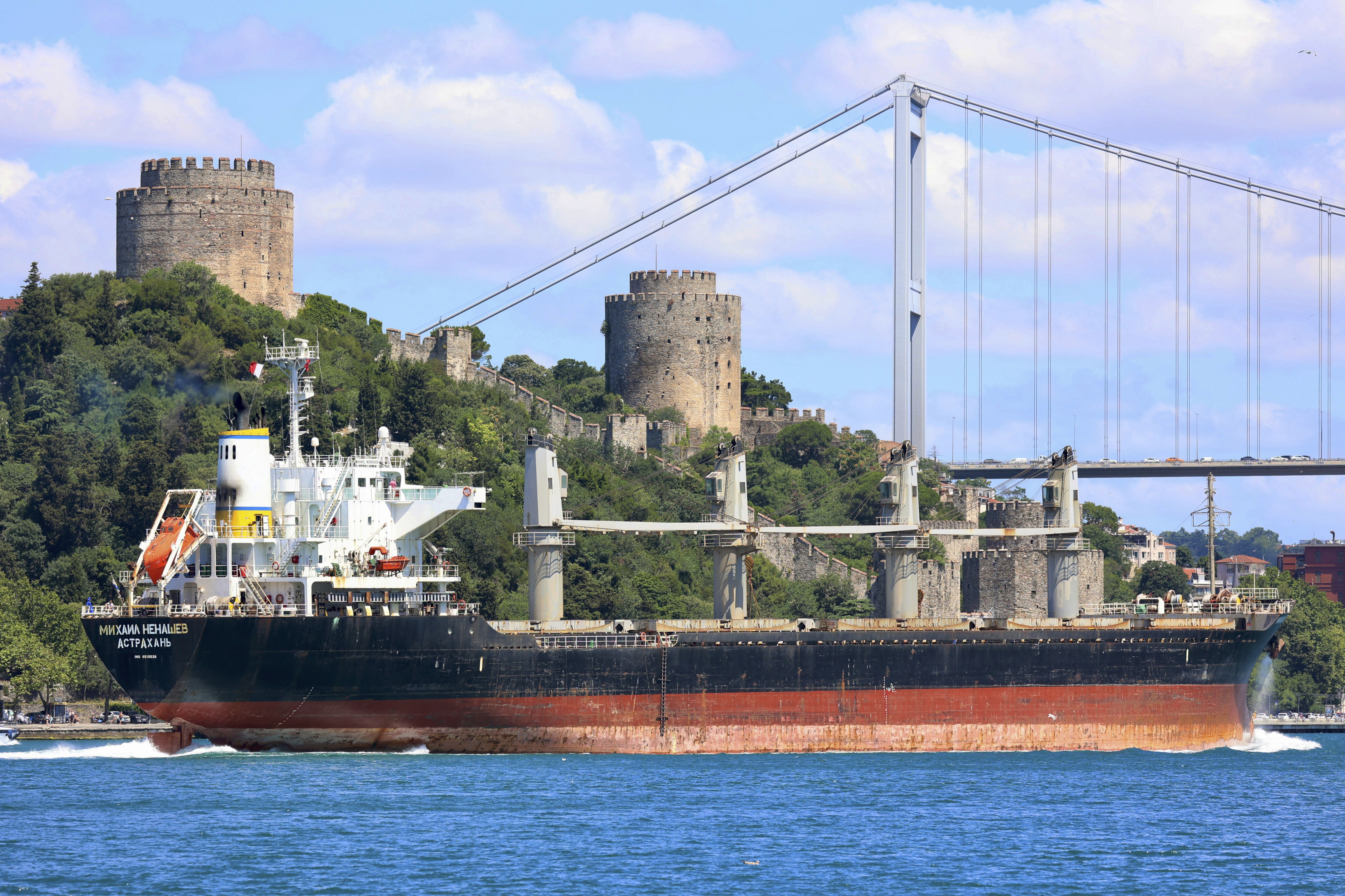 The cargo ship Mikhail Nenashev sails past Istanbul, Turkey, on July 4, 2022. An Associated Press investigation shows the ship, owned by a sanctioned Russian state-owned defense contractor, is part of an extensive Russian-run smuggling operation that has been hauling stolen Ukrainian grain from ports in occupied Crimea to customers in the Middle East. (AP Photo/Yoruk Isik)
The cargo ship Mikhail Nenashev sails past Istanbul, Turkey, on July 4, 2022. An Associated Press investigation shows the ship, owned by a sanctioned Russian state-owned defense contractor, is part of an extensive Russian-run smuggling operation that has been hauling stolen Ukrainian grain from ports in occupied Crimea to customers in the Middle East. (AP Photo/Yoruk Isik)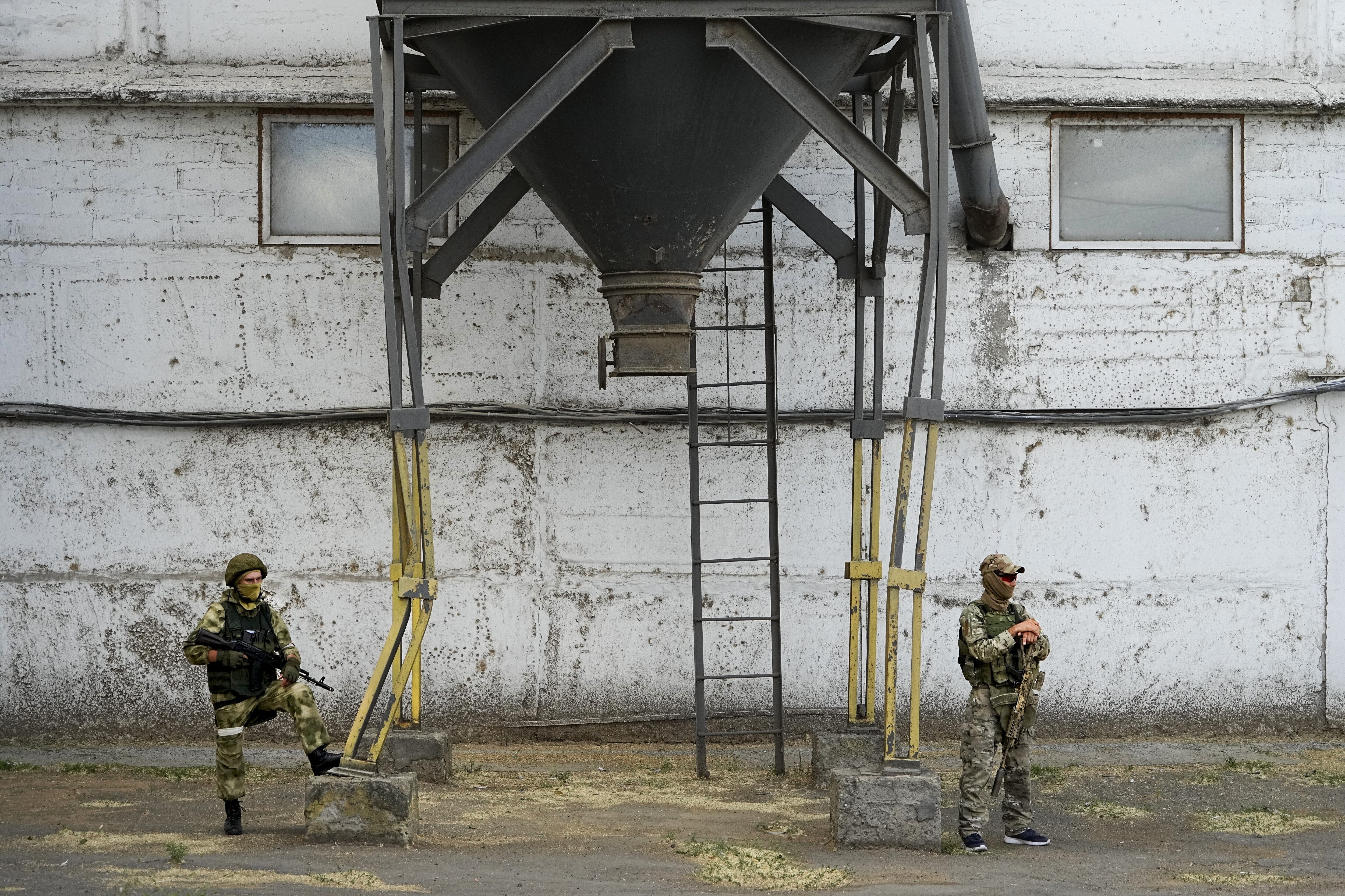 FILE - During a trip organized by the Russian Ministry of Defense, Russian soldiers stand guard as foreign journalists visit a grain elevator in Melitopol, southern Ukraine, Thursday, July 14, 2022. An investigation by The Associated Press shows a Russian-run smuggling operation has been transporting grain from occupied regions of Ukraine by train and truck to ports in Crimea, where it is shipped to buyers in the Middle East. (AP Photo, File)
FILE - During a trip organized by the Russian Ministry of Defense, Russian soldiers stand guard as foreign journalists visit a grain elevator in Melitopol, southern Ukraine, Thursday, July 14, 2022. An investigation by The Associated Press shows a Russian-run smuggling operation has been transporting grain from occupied regions of Ukraine by train and truck to ports in Crimea, where it is shipped to buyers in the Middle East. (AP Photo, File)